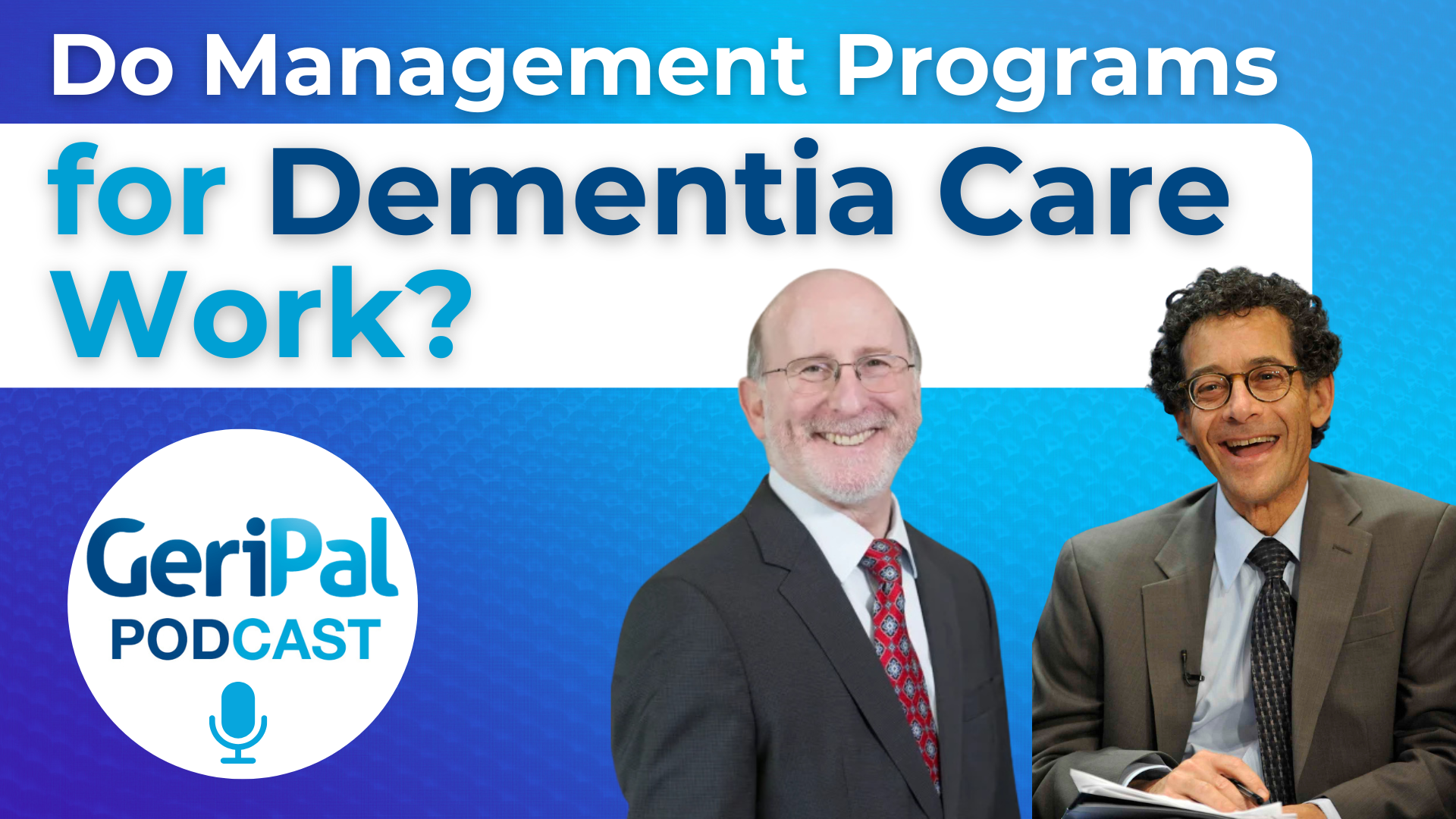
Proton pump inhibitors are one of the most widely used medications. As I note in the podcast below, I was in my local drug store the other day, and an entire shelf segment, top to bottom, was filled with medications for “heartburn,” and most of them were proton pump inhibitors. And those are just the over the counter variety.
So wouldn’t it be a public health disaster if proton pump inhibitors, or PPIs, increased a persons risk for dementia? Even if the increase in dementia risk is only slight, on a population level, given the vast number of people using PPIs, the consequences would be disastrous. A major study in JAMA showed just such a linkage, raising serious alarm about this issue.
So with this urgent question in mind, we talk with two authors about their more recent studies in JAGS suggesting that there is no such linkage.
We talked with Shelly Gray, from the School of Pharmacy and the University of Washington, and Felicia Goldstein from Emory University, about their studies, the current evidence as a whole, and what an individual on PPI’s should think at this time about his or her risk of dementia.
Here is the bottom line, for those who can’t wait. In response to Eric asking what advice they would give their 75 year old neighbor who is taking PPI’s, Dr. Gray said:
I would tell her that the information is conflicting, but some really high quality studies have been done and have not found an association, and if this medication is necessary to manage her condition, that she should continue taking it.
However, I will say that we do know that these medications are overused, and so I still believe in the tenet of geriatric medicine that we try to deprescribe when possible, so I would try to reassure her and let her know that it’s not a done deal and that the high quality studies do indicate that there doesn’t seem to be an association.
Links:
- JAMA paper of German data suggesting PPIs may increase risk of dementia
- JAGS paper by Gray using data from the University of Washington’s Adult Changes in Thought Study showing no increased risk
- JAGS paper by Goldstein using data from Alzheimer’s disease research centers showing no increased risk
Image of marmot pondering if PPI’s cause dementia (courtesy Wikimedia Commons)
Eric : Welcome to the GeriPal Podcast. This is Eric Widera.
Alex : This is Alex Smith.
Sei : This is Sei Lee.
Eric : Alex, who do we have on for our podcast today?
Alex : Today, we have two guests joining us via the Skype line. First, we have Shelly Gray, who’s from the School of Pharmacy at the University of Washington. Welcome to the GeriPal Podcast, Shelly.
Shelly : Thank you so much for having me.
Alex : And we have Felicia Goldstein, who’s joining us from the Department of Neurology at the School of Medicine at Emory University. Welcome to the GeriPal Podcast.
Felicia : Thank you.
Eric : Great! At the start of every one of our podcasts, we ask for a song request. Shelly or Felicia, do you got a song for Alex to sing?
Felicia : Yes. Heartburn by Alicia Keys.
Eric : Make it an easy one for Alex.
Alex : First, let me just say, that song has virtually no guitar.
Felicia : Oh, sorry.
Alex : Very high voice and it’s kind of funk. It has some great horns and drums, so I’m going to do about one second of that song.
Felicia : All right.
Alex : Ready? This is it. This is all you get. [singing]
Alex : That’s about as much as I could do.
Felicia : Excellent. Thank you.
Sei : That’s great.
Eric : We’re gonna push Alex at the end of this podcast to try a little bit more of that. Do proton pump inhibitors cause or worsen dementia?
Alex : That is the question.
Eric : What got you both interested in this subject?
Shelly : Well, I became interested when a few papers were published on this topic from a group in Germany and one was in a prominent journal, JAMA Neurology, and I was very surprised to see the association, and so our group from Seattle wanted to explore this and see if perhaps in our data, we would be able to replicate or refute those findings. Obviously, these medications are used widely by older adults, and so this was a significant public health issue, if the association was true.
Eric : Felicia, for you, always been a PPI fan or how did you get interested in it?
Felicia : Well, I was watching the Today Show one morning and a news story came on about a recent study out of Germany that had shown that PPIs were a risk factor for dementia, and I became interested and thought, well, maybe we can look at this issue in the United States and see if we can replicate these findings, as Shelly said that PPIs are widely prescribed, and thought it was important enough to explore further.
Eric : Okay. I’m going to decrease the acid in the stomach. What is the rationale that could lead to worsening dementia? Is there a theoretical underpinning that makes this even plausible?
Felicia : Well, there’s been some animal work showing a link between antacids and increased beta-amyloid levels in the brain, and we know that amyloid is a part of what happens to the brains of people who have dementia and Alzheimer’s disease, so this led to the idea that potentially, they, in older adults, could be promoting amyloid deposition in the brain.
Shelly : Just to add to that, there’s another mechanism that has been proposed that perhaps long-term acid suppression will lead to B12 deficiency, and we know that B12 deficiency that’s unrecognized or untreated has cognitive effects.
Eric : All right. Two possible mechanisms that make this plausible and a couple of studies, before each of you are saying, that there is an association. What did you guys do? Maybe we’ll start off with the first one.
Felicia : Yes. We had a large database of over 30 Alzheimer’s disease research centers, and Emory is one of the Alzheimer’s research centers. These are NIH-supported centers that collect information from individuals using a standardized battery, including neuropsychological testing and very well-characterized phenotyped individuals, and so we had a retrospective data on over 10,000 people who would come in to the Alzheimer’s centers and had yearly evaluation.
We were able to look at people who were never on PPIs, people who took them intermittently, and then there were people who were always on these medications over time, and we were able to ask, “If a person started out, for example, at baseline with normal cognition, did they then over time convert to mild cognitive impairment or dementia and specifically, Alzheimer’s disease?”
Basically, we found that there was no increased risk of conversion to mild cognitive impairment, dementia or Alzheimer’s disease as a function of intermittent or always being a PPI user.
Alex : In fact, didn’t you find, this is Alex, that there was a lower risk of declining cognitive function?
Felicia : We did, and again this is statistical. The P value was statistically significant, but it was a mild protective factor for PPI use, but yes, that is what we did find in fact that there was no increased risk and in fact maybe a minor or very mild neuroprotective benefit in our study.
Eric : Shelly, in your study, what did you do? What did you find?
Shelly : We used the data from the Adult Changes in Thought Study, which is a longstanding, ongoing prospective cohort study, conducted by Kaiser Permanente Washington and the University of Washington, with the goal of looking at risk factors for incident dementia. We looked at roughly 3,400 people who did not have dementia at baseline and followed them for an average of seven and a half years.
A few features of this study is that we screen participants every two years for incident dementia using standard criteria, and we have access to electronic pharmacy data, so we’re able to look at the exposure over long periods of time.
In this study, we looked at exposure over a 10-year period, and we overall did not find an association between PPIs and dementia, including Alzheimer’s disease, and in fact, when we looked at those people who had the heaviest use, and this is equivalent to five years of daily use at the typical doses, we also did not find a higher risk, so that was the basic findings we have.
Felicia : What was really excellent about Shelly’s paper that really hits home, I think the convincing evidence is that they had information about dosage of how much people were taking of these medications. It’s something that we did not have in the data set we used, so I think that was a really extra layer that was important in your paper, Shelly.
Shelly : Thank you, Felicia.
Alex : Could you contrast your papers and your studies and designs with the previously published papers that had shown an association between PPI use and dementia?
Eric : Yeah. Why was there a difference between yours and the ones that came out previously?
Shelly : That’s always the golden question in epidemiology. For our study, there are a couple of major differences. First is the method for detecting dementia. The prior studies, excluding Felicia’s, used administrative data, also known as claims data, and so basically, we know that dementia is underdetected, and so for studies using claims data, that’s the real risk is that real dementia cases are undetected.
We know that people who make frequent healthcare visits, such as a person with heartburn or stomach problems, they’re visiting their healthcare provider more frequently, and they also have the possibility of having their dementia diagnosed sooner, and so that was the key feature is that we screened people prospectively using standard criteria, so we feel like we were able to detect people sooner.
Alex : So you think your ascertainment of outcome was better in your study, that dementia ascertainment?
Shelly : Yes, I do and it’s similar to the methods used in Felicia’s study as well.
Felicia : That’s something that we also felt. We pointed out that we felt that our sample using a … People who have seen it in academic centers probably led to better ascertainment and diagnosis of cognitive difficulty.
We also had a full neuropsychological testing on people in our study, which other studies had used, for example, just the mini mental state examinations, so it’s a cursory screening test.
Also, we had a wider age range. We used people who were 50 and older, whereas these other studies were limited to people 70 and older, so we were able to examine the issue in a broader age range, so people who actually are using PPIs as well.
Alex : Is there any reason to suspect there might be some bias or confounding that’s muddling the association between PPI use and dementia in either direction?
Shelly : Well, certainly, that’s another key feature that is different from our study in the prior studies, excluding Felicia’s. When you see an association between any medication and outcome, the first question you need to ask yourself, “Is it due to the PPI therapy or is it due to factors associated with being prescribed a PPI?”
For example, we know people with GERD are more likely to be obese, more likely to be smokers, and these are factors that are also related to dementia risk. In general, users of PPIs have poorer health and poorer health is also, the various conditions, can also be associated with dementia.
Our study, we felt like we were able to control for more complete set of confounders than prior studies, and we were able to use information that we collected directly from the ACT participants rather than relying solely on administrative data, so our measurement, we feel, is better and more complete of these confounders.
Alex : Felicia, thoughts about confounding and bias?
Felicia : Yeah, I totally agree with what Shelly said, of course. Some of the PPI users were, by nature, less healthy. They had, for example, more cardiovascular risk factors, so it’s potentially possible that they were getting better healthcare, which could’ve reduced their dementia risk.
There could’ve been lots of issues going on and really, the way to definitively answer the question would be some sort of a longitudinal, epidemiological study where we follow people from a very young age on just to look at this issue more carefully.
Sei : It almost feels like we have come full circle, where, initially, we thought about PPIs being very benign, but then PPIs were so often prescribed to patients who got into the hospital that we started seeing these associations between PPIs and pneumonia PPIs and all sorts of different outcomes.
After the initial scare, I feel like for most of those associations, subsequent follow-up studies actually don’t show a lot of there-there and then we ended up going back to “PPIs don’t seem that dangerous. They probably should be avoided unless you actually need them,” but it seems like we’ve come full circle to “PPIs are actually not as terrible as maybe we had feared.” Thoughts about that?
Felicia : I think that’s true and I think that’s true of other medications as well. For example, statins, there was a big scare, awhile back about statins being associated with an increased risk for dementia and subsequent studies have come out showing that they aren’t an increased risk.
I think that the more evidence-based articles that come out looking at this issue, the more that we see there is controversy, and we get differences of opinion, but I do think that people need to weigh the discomforts associated with heartburn and being so uncomfortable to decide on an individual basis, if there is a risk, which our studies suggest there is not, that they need to take these medications.
Eric : Well, let me ask you that then. Do you feel, with both of your studies out there, that the case is closed, that PPIs don’t cause dementia or do you feel like you have to do further research that helps answer that question of whether or not there is a risk?
Shelly : Well, with any epidemiology study, the more information you have-
Felicia : No, we answered it. We don’t need to do anything more.
Eric : That’s what I’m looking for.
Alex : It’s closed.
Sei : Okay. Yeah, that’s it. We can stop the podcast right now.
Shelly : I’m sorry. I’m just …
Eric : Further research is needed.
Felicia : Nah.
Shelly : I wish we could say that.
Felicia : Move on.
Shelly : I guess an important issue, with any of these studies, looking at many medications and dementia risk, there’s still a lot of unknowns and one important unknown is that we don’t know where that critical window of exposure is in terms of looking at risk of medications and dementia.
Is it right around the dementia diagnosis? Is it midlife? I think what I would like to see, moving forward, is … Again, these databases are scarce, but studies that can really look at people from midlife on and look at long-term use.
Our study, we really captured around five years. That’s probably where we had most of our data in terms of the longer-term users, so I don’t think we can rule out people using them for 10 or 15 years might have an increased risk.
Alex : If we start that study now, we may have an answer in 20 years or is there some ongoing study that we can look to that might have those data?
Felicia : I don’t know. I think, Shelly, what you’re saying is you would like to look more at midlife, people who are taking these early in midlife and being able to follow these folks earlier than we can start right now.
Our study was 50 and older and many of the studies have looked at 70 and older. I don’t know. I’m thinking of databases such as Framingham, if they would have such information on even younger people maybe.
Alex : It’s possible there’s a data set out there already.
Felicia : Potentially.
Sei : The other thing that I was thinking about was … I wonder. It seems like at least one of the plausible mechanistic connections between PPIs and dementia is through amyloid deposition, and my understanding of the NACC database was that it actually has other types of dementia, so I was wondering if there’s future work there looking at if there’s an association between PPIs and different dementia subtypes, some of which may not be amyloid-dependent.
Shelly : Yeah. The ACT Study does look at different types of dementia, so currently, Alzheimer’s disease makes up the highest number of cases, but as the ACT Study grows, we are getting more and more numbers of people that have vascular dementia to a point where we might be able to do analyses just looking at vascular dementia, but currently, we don’t have … It would limit our analyses because of the number of cases, but with time, I think that those analyses are possible.
Sei : Felicia?
Felicia : Yeah, I agree. Right now, the numbers would be too small to be able to look at other types of dementia and risk factors and the risk associated with PPI use.
Alex : I was in Walgreens the other day and there was an entire shelf, right, of PPIs. These are ubiquitous, ubiquitously prescribed and available over the counter. How seriously do we need to take this concern and how much effort do we need to put into further evaluating the safety risk?
You’ve talked about some next step studies that could be done. Where are we right now in terms of the concern level? It sounds like, from your research, you were saying, there’s not as much concern, but is it still enough of a concern that we need to put considerable resources towards investigating this question at this time?
Felicia : My personal feeling is no, we don’t need to be concerned about it. I don’t think that there’s sufficient evidence to support a great risk. I do know, however, that people are still afraid to take PPIs. There’s still a belief out in the public that they could be associated with increased risk for Alzheimer’s disease, so that’s concerning.
Shelly : Yeah, I think in terms of resources, we would be best served by providing education directly to older adults to help them understand the information that they’re being blasted with from the media and to really understand that with any medication, there are risks.
However, taking a medication that improves quality of life or may reduce morbidity or mortality may be the right choice for that individual patient, and so we’re always weighing risks versus benefits, and so I think a better education to the public to settle down the concern about using these medications, at least, in older life, doesn’t appear to be related to dementia onset.
Eric : Shelly, if your next door neighbor, I’m just going to make this up, who’s 75, is on a PPI and will come to see you and says, “I’m really worried. I saw this news article that my medicine may cause dementia,” and she heard about you being an expert on this. What do you tell her?
Shelly : I would tell her that the information is conflicting, but some really high quality studies have been done and have not found an association, and if this medication is necessary to manage her condition, that she should continue taking it.
However, I will say that we do know that these medications are overused, and so I still believe in the tenet of geriatric medicine that we try to deprescribe when possible, so I would try to reassure her and let her know that it’s not a done deal and that the high quality studies do indicate that there doesn’t seem to be an association.
Eric : Great! We’re going to have links to both of the JAGS articles that we have, both from Felicia and from Shelly, on our GeriPal website and maybe with that …
Alex : Oh. Sei has one more question.
Sei : This may be a moot point, but when did PPIs become over-the-counter, Alex’s story about the number of PPIs, because my understanding is that over-the-counter medications are both not captured as well in administrative data or not recalled as well by patients, and so I’m wondering if there is a temporal bias here, where more recent studies in the non-exposed group, they may actually be exposed leading to the current negative findings.
Shelly : Okay. They became available as OTC products in 2003, and a very nice feature of the ACT study is that participants that use Kaiser, even over-the-counter medications continue to be covered by the pharmacy, unlike some other health insurers, and so we felt assured that people who are using these long-term that they would be filling these through the Kaiser Pharmacy, so we feel like our capture is really good.
In addition to the pharmacy files, we also ask them about any medication use, including over-the-counters, every two years at their bi-annual ACT visits, and so we also looked at any PPI use that was reported and folded that into our measure as well.
Eric : How about we end with a little bit more of Alex trying to sing Heartburn from Alicia Keys?
Alex : Yeah, right. Let’s say thank you very much to both our guests. Thank you so much, Shelly, for joining us.
Eric : Thank you, Felicia.
Shelly : Thank you for this opportunity. This was awesome.
Felicia : Thank you.
Alex : Yeah. Thank you, Felicia. We really appreciate it. [singing]
Eric : That’s it!
Alex : That’s it!
Eric : Awesome!
Sei : That’s all we get?



